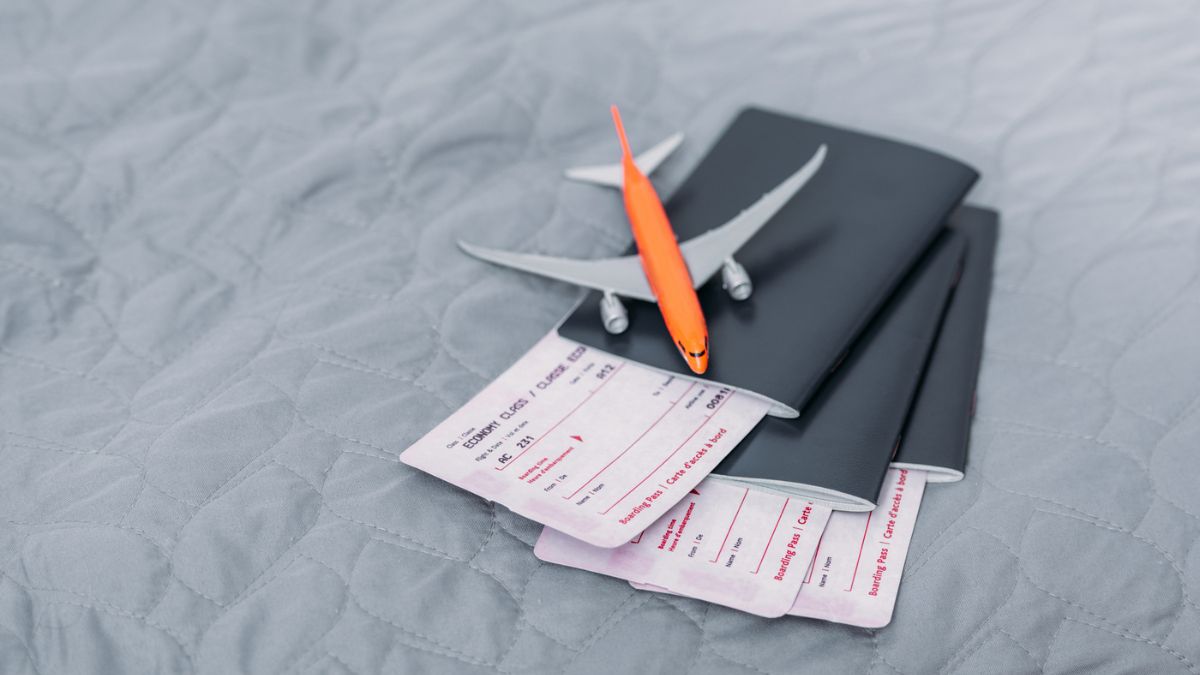How to Deal with Ticket Issues on Airlines? A Step-by-Step Guide

As participants in Amazon Associates and other programs, we earn from qualifying purchases. This comes at no additional cost to you. For more details, see our Affiliate Disclosure.
Navigating the world of airline tickets can sometimes feel like trying to decipher a foreign language. Whether it’s an error during booking, a sudden change in plans, or an unexpected cancellation, ticket issues can quickly turn your travel excitement into stress. Fear not! This step-by-step guide is here to help you tackle any ticket troubles you may encounter, ensuring a smoother journey from start to finish.
Understanding Different Types of Ticket Issues
Navigating the complexities of airline tickets can be daunting for even the most seasoned traveler. Mistakes happen, systems glitch, and sometimes, plans simply change. While most travelers are aware of the more common ticketing challenges, such as booking errors or flight cancellations, there’s a broad spectrum of potential issues that can arise. Let’s delve into these varied ticket issues to better equip ourselves for future journeys.
Pricing Discrepancies:
- Fare Jumping: This occurs when the price of a ticket increases suddenly during the booking process.
- Currency Conversion Errors: Sometimes, the ticket price might be displayed in a different currency and the conversion might not be accurate.
- Hidden Fees: Additional costs like baggage fees, seat selection charges, and others that might not be evident at first glance.
Name Mismatches and Corrections:
- Spelling Errors: A minor typo can cause significant trouble at the airport.
- Name Changes: Challenges that arise if you’ve legally changed your name after booking a ticket.
- Mismatch with Passport: Your ticket name must match your passport or identification, including middle names or initials.
Ticket Class or Seating Errors:
- Downgrades: You’ve booked business or first class, but get placed in economy.
- Seat Preference: Requested aisle or window but received something else.
- Special Seating Needs: Problems related to requests for extra legroom seats, or issues with assigned seats near emergency exits.
Ticket Validity and Restrictions:
- Travel Blackout Dates: Some discounted tickets might have travel restrictions during peak seasons.
- Stopover Limitations: Restrictions on how long you can stay in a connecting city.
- Fare Rules: Limitations on ticket changes, refunds, and other modifications.
Lack of Ticket Confirmation:
- Pending Status: Your booking is in limbo, neither confirmed nor denied.
- E-ticket Issues: Not receiving an electronic ticket after booking.
- Discrepancies with Booking Agents: When your ticket details differ between the airline and a third-party agent.
Lost or Misplaced Physical Tickets:
- Replacement Procedures: Steps to take if you’ve lost a paper ticket.
- Associated Costs: Potential fees for getting a duplicate ticket.
- Transition to E-tickets: Why many airlines now prefer electronic over paper tickets.
Understanding these diverse ticketing issues not only prepares travelers for potential hiccups but also provides them with the knowledge to act swiftly and efficiently should a problem arise.
Booking Mistakes and How to Correct Them
In today’s digital age, the convenience of online booking has led to a surge in independent travel planning. However, the process isn’t always foolproof. A moment of distraction or a simple typo can result in errors that may cause headaches later. But don’t despair—most booking mistakes are correctable. Here’s a breakdown of common booking errors and how to address them.
Accidentally Booking the Wrong Date or Destination:
- Immediate Action: If you notice the error right away, some airlines offer a grace period (usually 24 hours) during which you can cancel or modify a booking without penalty.
- Re-booking: If outside the grace period, you might incur fees. It’s crucial to weigh the costs of re-booking against potential losses.
Duplicate Bookings:
- Spotting the Error: Check for multiple confirmation emails or credit card charges.
- Contacting Customer Service: Inform the airline immediately. They’re usually understanding about genuine mistakes and may waive cancellation fees.
Entering Incorrect Passenger Details:
- Name Corrections: Minor spelling mistakes can usually be rectified by calling the airline. However, major changes (e.g., completely different names) might require re-booking.
- Incorrect Frequent Flyer Number: Simply call the airline or modify it online through the booking platform.
- Wrong Gender or Title: While often not an issue, it’s best to contact the airline for correction to avoid potential complications.
Failing to Include Special Requests:
- Meal Preferences: If you forgot to select a vegetarian, halal, or other special meal, you can usually add this by editing your booking online or calling the airline.
- Accessibility Needs: Inform the airline as soon as possible if you require wheelchair access, extra legroom for medical reasons, or other accommodations.
Errors in Additional Services:
- Baggage: If you’ve booked the wrong baggage allowance, most airlines let you adjust this online or via their customer service.
- In-flight Services: Mistakes in pre-booked services like Wi-Fi or in-flight entertainment can typically be rectified by contacting the airline directly.
Not Reviewing Fare Conditions:
- Refund and Cancellation Policies: Always read the fare conditions. If you’ve booked a non-refundable ticket thinking it was flexible, you might be in for extra charges.
- Stay Duration: Some promotional fares might have minimum or maximum stay requirements. Be sure to check these when booking.
Booking Through Unfamiliar Platforms:
- Verify Authenticity: If you mistakenly booked through a questionable website or agent, check your booking’s validity with the airline directly.
- Seek Reconciliation: If there are discrepancies, try to resolve them with the booking platform first. If unsuccessful, contact your credit card company about a potential chargeback.
Mistakes happen, but they don’t have to ruin your trip. By acting promptly and being aware of airline policies, you can correct most booking errors with minimal hassle. Always keep a copy of your correspondence and be patient—customer service agents are more inclined to help when approached calmly and respectfully.
Handling Flight Changes and Cancellations
Even with the best-laid plans, travel can be unpredictable. Flight changes and cancellations are among the top concerns for travelers, as they can significantly disrupt itineraries. Whether it’s due to operational requirements, weather conditions, or unforeseen events, it’s essential to know your rights and the steps you can take to minimize inconvenience.
Proactive Measures to Take:
- Stay Informed: Sign up for airline notifications to receive real-time updates about your flight status.
- Travel Insurance: Consider investing in a policy that covers cancellations or delays, ensuring you’re compensated for any unexpected changes.
- 24-hour Rule: Most airlines in the U.S. (and some international ones) allow passengers to cancel a booking without penalty within 24 hours of purchase, even if the ticket is non-refundable.
Seeking Compensation or Refunds:
- Know Your Rights: Familiarize yourself with the airline’s compensation policy for delays, cancellations, and re-routing. Regulations like the EU’s EC 261/2004 provide specific rights for passengers in case of significant disruptions.
- Requesting Compensation: Approach the airline’s customer service desk or use online platforms that help passengers claim compensation.
- Vouchers vs. Cash: Some airlines might offer vouchers as compensation. Know that, depending on the circumstances and local regulations, you might be entitled to cash.
Managing Connecting Flights:
- Protection on Linked Bookings: If you’ve booked connecting flights on one ticket, the airline is usually responsible for re-accommodating you if there’s a disruption.
- Separate Bookings: If flights are booked separately and one is changed or canceled, the airline isn’t typically responsible for subsequent flights you might miss. Always leave ample time between separate bookings.
Voluntary Changes and Associated Costs:
- Change Fees: Many tickets come with fees for voluntary changes. Be aware of these when considering altering your travel plans.
- Fare Differences: If you change to a flight that’s more expensive, you’ll usually need to pay the difference.
Re-accommodation Procedures:
- Next Available Flight: In case of cancellations, airlines often try to place passengers on their next available flight to the destination.
- Alternate Airlines: Some carriers might offer to book you on a different airline to get you to your destination faster.
Overnight Delays and Accommodations:
- Hotel Vouchers: If you’re stranded overnight due to an airline’s fault, they may provide hotel accommodation, meals, and transport.
- Self-booking: If the airline doesn’t offer accommodation, keep your receipts when booking your own. You might be able to claim these costs later.
Understanding Force Majeure:
- Act of God Events: In situations like natural disasters, political unrest, or pandemics, airlines may not offer compensation due to the extraordinary nature of the events. However, they should still offer re-routing or refunds.
The key to handling flight changes and cancellations effectively is to stay informed, understand your rights, and be proactive in communication with your airline.
Navigating Airline Overbookings
Airline overbooking, a practice where carriers sell more tickets than available seats on a flight, might seem counterintuitive. Yet, it’s based on statistical calculations that predict a certain number of no-show passengers. While this helps airlines maintain profitability, it can sometimes result in passengers being denied boarding. Here’s a guide to understanding, and navigating, the tricky waters of airline overbookings.
Why Airlines Overbook:
- Predicting No-Shows: Historical data often indicates a predictable number of passengers won’t show up, allowing airlines to overbook to compensate.
- Economic Reasons: Overbooking ensures that seats don’t fly empty, maximizing airline revenue.
Your Rights in the Event of Overbooking:
- Denial of Boarding Compensation: Depending on the country and airline, passengers denied boarding due to overbooking may be entitled to compensation.
- Alternate Arrangements: Airlines are typically obligated to arrange alternative transportation to get you to your destination.
- Refunds: If you choose not to be re-accommodated, you’re generally entitled to a refund for the portion of the ticket not used.
Volunteering to be Bumped:
- Incentives: Often, airlines will first ask for volunteers to give up their seats in exchange for compensation, which can include vouchers, meals, accommodations, or even cash.
- Negotiating the Offer: If you’re flexible, you can sometimes negotiate a better package, especially if the flight is critically overbooked.
Mandatory Bumping and Compensation:
- Last Resort: If there aren’t enough volunteers, airlines will deny boarding to passengers involuntarily.
- Criteria for Bumping: Airlines have their policies, but it’s often based on check-in time, fare type, frequent flyer status, or booking channel.
- Compensation Rules: In many regions, such as the EU or US, there are specific regulations dictating compensation amounts based on delay lengths and other factors.
Dealing with Additional Costs:
- Lodging and Meals: If you’re bumped to a flight the next day, the airline should cover hotel and meal costs.
- Missed Connections or Reservations: Keep receipts and communicate with the airline about any additional costs incurred due to the delay.
Preventing Being Bumped:
- Early Check-In: The earlier you check in, the less likely you are to be bumped, as some airlines bump based on last-in, first-out.
- Frequent Flyer Status: High-tier members of loyalty programs are less likely to be chosen for involuntary bumping.
- Booking Directly: Sometimes, bookings made through third-party platforms can be more vulnerable to bumping than those made directly with the airline.
Seeking Further Redress:
- Contacting the Airline: Always start by communicating with the airline’s customer service. They can address most concerns directly.
- Regulatory Bodies: If you believe your rights have been violated, you can escalate the matter to aviation regulatory bodies in many countries.
Overbookings, while inconvenient, are a part of modern air travel. By understanding the reasons behind the practice and knowing your rights and options, you can navigate these situations more confidently and even turn them to your advantage.
Managing Frequent Flyer and Loyalty Program Issues
Airline loyalty programs, often known as frequent flyer programs, offer a myriad of benefits for the regular traveler. From earning free flights to enjoying exclusive perks like lounge access, these programs are designed to reward loyalty. However, like any complex system, they can sometimes present challenges. Whether you’re facing missing miles or having trouble redeeming rewards, here’s how to address and prevent common frequent flyer program issues.
Understanding Point Accumulation:
- Reading the Fine Print: Not all flights or fare classes earn miles equally. Be sure to understand the earning rates and any restrictions.
- Special Promotions: Stay updated with ongoing promotions which might offer bonus miles or points.
Missing Miles or Points:
- Check Posting Times: Miles can take a few days to several weeks to reflect in your account, depending on the airline and type of transaction.
- Retroactive Claims: If your miles don’t appear after the typical posting period, most airlines allow you to submit a retroactive claim, often up to 6-12 months after the flight.
Redemption Challenges:
- Blackout Dates: Some dates, especially around holidays or peak travel times, might have restrictions or require more miles for redemption.
- Limited Availability: Award seats are limited. Consider booking well in advance or being flexible with your dates.
- Taxes and Fees: Even “free” award tickets might have associated taxes, fees, or fuel surcharges.
Tier Status and Benefits:
- Understanding Tier Requirements: Know the requirements to reach and maintain each elite status level, as they often involve both miles flown and spending thresholds.
- Missing Benefits: If a promised benefit like priority boarding or free checked baggage is overlooked, approach the airline staff politely or contact customer service.
Program Changes and Devaluations:
- Stay Informed: Airlines occasionally update their loyalty programs, which can affect how you earn or redeem miles. Sign up for program newsletters or updates.
- Adapting Strategy: If your preferred program undergoes unfavorable changes, consider diversifying your points strategy or exploring other programs.
Account Inactivity and Expiring Miles:
- Keep Active: Engage in small activities like making a minor purchase through an airline shopping portal to keep your account active.
- Mileage Expiry Extensions: Some airlines offer options to extend the life of your miles through certain transactions or by paying a fee.
Partner Airline Issues:
- Earning and Redeeming: Understand how to earn and redeem miles when flying with partner airlines, as it might differ from the main airline’s process.
- Credit Where Credit’s Due: Always ensure that you provide your frequent flyer number and it’s correctly associated with your booking when flying with partners.
Account Security Concerns:
- Regular Monitoring: Periodically check your account for any unauthorized or suspicious activity.
- Two-Factor Authentication: If the airline offers it, enable additional security measures to protect your account.
Merging or Transferring Miles:
- Between Personal Accounts: While most airlines don’t allow direct transfers of miles between different individual accounts, some may offer it with a fee.
- Family Pools: Some programs allow families to combine miles, making redemption easier.
By actively managing your frequent flyer account, understanding the program’s nuances, and promptly addressing issues, you can maximize the benefits of airline loyalty programs.
Special Requests and Accommodations
Air travel isn’t a one-size-fits-all experience. Many passengers have unique needs, whether it’s due to health conditions, religious practices, or personal preferences. Airlines are generally geared up to accommodate these special requests, but it often requires passengers to be proactive. Here’s a guide to making special requests and ensuring you receive the appropriate accommodations during your journey.
Dietary Needs:
- Meal Preferences: Whether for religious, dietary, or health reasons, most major airlines offer a range of meal options. These might include vegetarian, vegan, kosher, halal, gluten-free, and more.
- Ordering in Advance: Special meals typically need to be requested at least 24-48 hours before departure, though the earlier, the better.
Mobility Issues and Disabilities:
- Wheelchair Assistance: Airlines offer wheelchair services from check-in to boarding and during transit.
- Onboard Assistance: If you require assistance moving within the aircraft, inform the airline in advance so they can make necessary preparations.
- Traveling with Assistive Devices: Items like wheelchairs or mobility aids often have specific packing and checking guidelines.
Medical Needs:
- Traveling with Medication: Always keep essential medications in your carry-on. Some airlines might require a doctor’s note for certain medications.
- Oxygen and Breathing Devices: If you need supplemental oxygen or have a CPAP machine, check the airline’s policy. Some airlines provide oxygen, while others allow passengers to bring their own, with restrictions.
Seating Requests:
- Extra Legroom: Taller passengers or those with certain medical conditions might seek extra legroom seats. These can often be reserved for an additional fee.
- Seat Assignments: If you have specific seat preferences, it’s best to book in advance. Remember, bulkhead and exit row seats might have restrictions.
Traveling with Infants or Minors:
- Bassinet Requests: For long-haul flights, request a bassinet for your infant when booking.
- Unaccompanied Minors: Airlines generally have a service for children traveling alone, ensuring they’re taken care of from departure to arrival.
Cultural and Religious Accommodations:
- Prayer: If you need to pray during the flight, ask the cabin crew for the best time and place onboard.
- Dress Requirements: If your religious or cultural practice requires specific attire, such as a headscarf, you can wear it. However, for security checks, you might be asked to adjust or remove it temporarily.
Allergies and Sensitivities:
- Nut Allergies: While some airlines have stopped serving peanuts, others still do. Inform the airline of your allergy, and they might create a buffer zone or make other accommodations.
- Other Sensitivities: Whether it’s a sensitivity to fragrances or certain materials, communicate with the airline, and they’ll do their best to assist.
Special Celebrations:
- Birthdays, Anniversaries, etc.: If you’re celebrating a special occasion, some airlines might offer small gestures like a cake or an announcement. It doesn’t hurt to ask!
Making the Request:
- Timing: The earlier you make your request, the better. While booking is ideal, some requests can be accommodated if made at least 48 hours before the flight.
- Documentation: For some accommodations, especially medical, you might need documentation or approval.
Remember, airlines are committed to ensuring a safe and comfortable journey for all passengers. While they strive to meet special requests, there might be operational or safety limitations. Open communication and understanding from both sides can help create a smooth flying experience.
Working with Third-Party Booking Platforms
Navigating the world of airline ticket bookings can be daunting, especially with the myriad of third-party platforms available today. While these platforms can offer competitive prices and unique deals, they also come with their own set of challenges. If you’ve ever wondered how best to navigate issues with platforms like Expedia, Kayak, or Skyscanner, this guide is for you.
Understanding the Pros and Cons:
- Advantages: Price comparisons, exclusive deals, bundle offers, and user reviews can make third-party sites appealing.
- Drawbacks: Rescheduling, refunds, or addressing specific concerns might be more complicated compared to direct bookings.
Booking Tickets:
- Accuracy is Key: Ensure all details, especially names and dates, are correct. Some third-party sites may charge fees for corrections.
- Fare Rules: Before confirming a purchase, understand the fare’s restrictions, especially concerning changes and cancellations.
Managing Itinerary Changes:
- Initiated by You: If you need to make a change, it’s generally best to contact the third-party platform directly. They’ll liaise with the airline on your behalf.
- Initiated by the Airline: If the airline changes or cancels the flight, coordinate with the platform, but also check the airline’s policy or contact them directly if needed.
Refunds and Cancellations:
- Check the Policy: Refund and cancellation policies might differ from what the airline offers directly.
- Processing Time: Refunds from third-party platforms might take longer, as it involves coordination between the platform and the airline.
Special Requests and Accommodations:
- Making Requests: While you can often make seating preferences or meal requests during booking, it’s wise to verify them directly with the airline afterward.
- Complex Needs: For advanced requirements or assistance, consider booking directly with the airline for a smoother experience.
Loyalty Programs and Points:
- Earning Points: Not all bookings through third-party platforms qualify for airline loyalty points. Check both the platform’s and airline’s policies.
- Using Points: You generally can’t use airline-specific loyalty points on third-party platforms, with a few exceptions.
Issues During Travel:
- Delays and Missed Connections: If facing issues, you might have to liaise with both the platform and the airline. Having travel insurance can be beneficial in such scenarios.
- Baggage Issues: While the airline usually handles baggage problems, keep your booking platform’s details handy in case of disputes.
Customer Support:
- Who to Contact: For ticketing issues, start with the third-party platform. For in-flight or airport concerns, the airline is usually the best contact.
- Feedback and Reviews: Sharing your experiences can help other travelers make informed decisions.
Safety and Reliability:
- Read Reviews: Before booking through a third-party platform, especially lesser-known ones, check user reviews and ratings.
- Secure Transactions: Ensure the platform uses secure payment gateways. Look for “https://” in the web address and other trust signals.
Third-party booking platforms can be an excellent tool for savvy travelers looking for deals, but they also require a bit more diligence. By being informed and proactive, you can ensure a smoother travel experience, irrespective of how you book your ticket.
Preventative Measures to Avoid Ticket Issues
In the realm of air travel, the adage “prevention is better than cure” holds particularly true. While most ticketing processes are streamlined and user-friendly, issues can arise. Fortunately, many of these can be avoided with some foresight and a proactive approach. Let’s delve into the preventative measures that can help ensure a hassle-free booking and flying experience.
Book Directly When Possible:
- Avoid Misunderstandings: Direct bookings with airlines can reduce the chances of communication lapses that might occur with third-party platforms.
- Special Deals: Airlines sometimes offer exclusive discounts or perks for those booking directly through their website or app.
Double-Check Information:
- Correct Details: Ensure names match passport/ID details precisely. A simple typo can lead to boarding issues or costly change fees.
- Dates and Times: Verify your travel dates, especially if you’re booking for someone else or in a different time zone.
Understand Fare Rules:
- Flexibility: Before purchasing, know the restrictions related to changes, cancellations, and refunds. Sometimes, paying a bit more for a flexible ticket can save money in the long run.
- Baggage Allowance: Check the baggage limits to avoid unexpected fees at the airport.
Loyalty Programs and Profiles:
- Create a Profile: Having an airline profile can expedite the booking process, reducing the chances of errors.
- Keep Details Updated: Ensure that your contact information is current so the airline can reach you with any changes or updates.
Utilize Booking Reviews:
- Last Review: Before finalizing payment, many platforms offer a final review of your booking. Use this to catch any errors.
- Email Confirmations: Once booked, promptly check the email confirmation for correctness.
Plan for Peak Seasons:
- Book Early: During peak travel times, like holidays, flights fill up quickly. Early booking ensures you get the desired itinerary and fare.
- Avoid Last-Minute Changes: Making changes during these times can be costlier and more challenging due to limited availability.
Be Aware of Visa and Transit Requirements:
- Check Requirements: Some countries require visas even for short layovers. Ensure you meet all entry or transit requirements before booking.
- Sufficient Layover Time: If changing airlines or terminals, ensure you have enough time for possible delays and security checks.
Stay Informed:
- Sign Up for Notifications: Enable notifications from your airline or booking platform to stay updated on any changes to your flight.
- Regularly Check Flight Status: Especially on the day of travel, check for any delays, cancellations, or gate changes.
Protect Your Booking:
- Travel Insurance: Consider purchasing travel insurance that covers flight cancellations, delays, or other unexpected issues.
- Secure Documents: Take screenshots or printouts of your booking confirmation and any other essential documents.
Engage Proactively:
- Raise Concerns Early: If you notice any discrepancies or potential issues, contact the airline or booking platform immediately. The sooner an issue is addressed, the easier it usually is to resolve.
By adopting a meticulous approach to booking and being aware of potential pitfalls, many ticketing issues can be nipped in the bud.
Emergency Situations and Last-Minute Changes
The world of air travel, despite its predictability, is not immune to life’s unpredictability. Emergency situations can arise, necessitating last-minute changes to our carefully laid travel plans. Whether it’s a personal crisis, a sudden work requirement, or an unexpected global event, understanding how to navigate these abrupt shifts is crucial. This guide will shed light on how to manage emergency scenarios and the steps you can take to minimize disruptions.
Personal Emergencies:
- Immediate Contact: As soon as you know you can’t travel, contact the airline or booking platform. The sooner they’re informed, the more they can assist.
- Documentation: In cases like a medical emergency, bereavement, or other personal crises, airlines might offer waivers or reductions in change fees with appropriate documentation.
Travel Advisories and Global Events:
- Stay Updated: Check official advisories from sources like the World Health Organization, government travel departments, or the airline itself.
- Flexible Rebooking: During significant global disruptions, airlines often provide flexible rebooking options, allowing passengers to change or delay their travel without penalties.
Work-Related Changes:
- Proof of Change: If your employer changes your dates of travel, having official communication or documentation can help in negotiations with the airline for fee waivers or reductions.
- Consider Business Class: If work travel is frequent, sometimes business class tickets, though more expensive, come with more flexibility for changes and cancellations.
Natural Disasters:
- Airlines’ Response: Often, when natural disasters like hurricanes, earthquakes, or severe storms are forecasted, airlines might offer free changes or cancellations.
- Stay Safe: If you’re already at the destination, follow local guidelines, and stay informed about the situation.
Missed Flights:
- The ‘Flat Tire’ Rule: Some airlines unofficially follow this rule. If you arrive shortly after your flight departs due to unforeseen issues (like a flat tire), the airline may book you on the next available flight without charge.
- Stay Calm: Approach the airline staff politely and explain the situation. Their primary concern is safety and service, and they often do their best to accommodate.
Short-Notice Travel:
- Last-Minute Deals: Some airlines offer discounted seats close to the departure time. However, this is a gamble, as flights might also be full or more expensive.
- Pack Smart: Keep a basic travel kit ready for unexpected trips, so you’re not scrambling at the last minute.
Know Your Rights:
- Air Passenger Rights: Different countries have regulations protecting passengers in case of significant delays, cancellations, or other disruptions. Familiarize yourself with these, especially if traveling internationally.
- Compensation: In some cases, especially due to overbooking or technical faults, airlines might owe you compensation in addition to rebooking you.
Travel Insurance:
- Emergency Coverage: Ensure your travel insurance covers unexpected changes, including those due to personal emergencies.
- Act Fast: If you need to make a claim, contact your insurance provider as soon as possible, and keep all relevant documentation handy.
Stay Connected:
- Mobile Apps: Airline apps usually provide real-time updates on flight status, and they might also facilitate quick rebooking in case of disruptions.
- Helpline: Store the airline’s helpline number in your phone. In a crunch, speaking directly to an agent can be the fastest way to find a solution.
Emergencies and unexpected changes can be stressful, especially when intertwined with the complexities of air travel. But with a mix of preparation, knowledge, and a calm demeanor, these hurdles can be navigated with relative ease.
Customer Service Best Practices
In today’s competitive marketplace, customer service can significantly differentiate businesses and influence customer loyalty. Delivering excellent customer service is crucial for both retaining current customers and attracting new ones. To ensure customer satisfaction and build lasting relationships, companies must adopt best practices in their service delivery. Here’s a comprehensive guide to customer service best practices:
Active Listening:
- Understand Needs: Actively listen to customers to genuinely understand their concerns or needs.
- Clarify: Ask open-ended questions to get a clearer picture of the issue.
Empathy and Patience:
- Show Genuine Concern: Empathize with customers’ problems, showing them that you care.
- Stay Calm: No matter how frustrated a customer might be, always remain calm and composed.
Quick Response Time:
- Acknowledge Promptly: Even if you can’t provide an immediate solution, acknowledge the query or concern swiftly.
- Set Expectations: Inform the customer about the estimated time it will take to resolve the issue.
Effective Communication:
- Be Clear and Concise: Avoid jargon and communicate solutions in a simple, straightforward manner.
- Follow Up: Ensure that the customer’s issue was resolved and check back to get feedback.
Knowledgeable Staff:
- Continuous Training: Regularly train customer service representatives on products, services, and company policies.
- Empower Decision Making: Allow reps to make decisions within a framework, ensuring faster issue resolution.
Feedback Collection:
- Surveys: Regularly send out customer satisfaction surveys to gauge service quality.
- Act on Feedback: Analyze feedback and implement changes to improve service continuously.
Utilize Technology:
- Help Desks and CRMs: Use software solutions to track, manage, and resolve customer queries efficiently.
- Multi-Channel Support: Offer support through various channels – phone, email, chat, and social media.
Personalize Interactions:
- Know Your Customer: Use data and interaction history to provide tailored solutions.
- Use Names: Addressing customers by their name makes the interaction more personal and warm.
Maintain Consistency:
- Standardized Procedures: Have clear guidelines and protocols for common issues to ensure consistent service across the team.
- Quality Assurance: Regularly monitor and evaluate customer interactions to maintain service standards.
Seek Continuous Improvement:
- Encourage Innovation: Always be on the lookout for ways to enhance customer service methods.
- Regular Reviews: Hold periodic meetings to review performance and discuss areas of improvement.
Maintain Transparency:
- Be Honest: If a mistake has been made, admit it, apologize, and find a way to make it right.
- Clear Policies: Ensure all service-related policies (like returns, warranties, etc.) are clear and easily accessible.
Celebrate and Reward:
- Acknowledge Excellence: Recognize and reward customer service reps who go above and beyond.
- Encourage Growth: Offer opportunities for career progression and skill development.
Build a Customer-Centric Culture:
- Leadership Involvement: Ensure that top management is involved in shaping the customer service ethos.
- Internal Feedback: Encourage inter-departmental feedback to improve overall service coordination.
In the end, customer service is all about building trust and long-term relationships. By implementing these best practices and fostering a culture that genuinely values customers, businesses can not only meet but exceed customer expectations, leading to enhanced loyalty and sustained growth.






